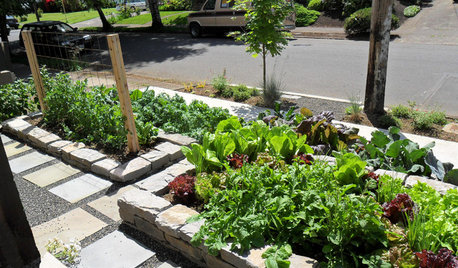Fresh horse manure...is it too hot?
williamcartwright
16 years ago
Related Stories

GARDENING GUIDESThe Poop Scoop: Enrich Your Soil With Good Old Manure
Get over the ick factor already — this natural super-ingredient for soil has so many benefits, you'll wonder why you ever went chemical
Full Story
FRONT YARD IDEASWelcome Edibles Into the Front Yard for Fresh Food and More
Give your front yard design a boost and maybe even make new friends by growing fruits and vegetables
Full Story
FEEL-GOOD HOMESimple Pleasures: The Joy of Fresh Sheets
Make your bed a place of comfort and relaxation with good-quality linens, ample pillows and other pleasing accoutrements
Full Story
UPHOLSTERYSlipcover Magic: Casual, Washable and Fresh for the Season
Reinvent your sofas, chairs and ottomans with surprisingly chic and versatile slipcovers
Full Story
YELLOWMustard Yellow Offers a Fresh Taste for Rooms
New shades and tones have sown the seeds of a mustard-yellow revival, and rooms everywhere are reaping the benefit
Full Story
HOUZZ TOURSMy Houzz: A Soothing Fresh Start in Dallas
See how a designer helped outfit a time-strapped family's new house in a contemporary, relaxed style
Full Story
HOUZZ TOURSMy Houzz: Fresh Color and a Smart Layout for a New York Apartment
A flowing floor plan, roomy sofa and book nook-guest room make this designer’s Hell’s Kitchen home an ideal place to entertain
Full Story
MUDROOMSRoom of the Day: This Mudroom Is Just Plain Hot
Wait till you see what’s behind the hooks and bins in this genius family drop zone
Full Story
EDIBLE GARDENSSummer Crops: How to Grow Tomatoes
Plant tomato seedlings in spring for one of the best tastes of summer, fresh from your backyard
Full Story
DREAM SPACESJust a Few Things for the Dream-Home Wish List
A sunken hot tub, dedicated game room, tree house, hidden wine cellar and more. Which of these home luxuries would you like best?
Full Story





deerslayer
buzzwoods_yahoo_com
Related Professionals
Arlington Landscape Architects & Landscape Designers · Manorville Landscape Architects & Landscape Designers · Zion Landscape Architects & Landscape Designers · Edmond Landscape Contractors · Del Aire Landscape Contractors · National City Landscape Contractors · Pueblo West Landscape Contractors · Waldorf Landscape Contractors · Denton Swimming Pool Builders · Randolph Swimming Pool Builders · Castro Valley Fence Contractors · Downey Fence Contractors · Draper Fence Contractors · Lexington Fence Contractors · La Puente Fence ContractorsBilll
williamcartwrightOriginal Author
deerslayer
williamcartwrightOriginal Author
deerslayer
williamcartwrightOriginal Author
Billl
luckybottom
deerslayer